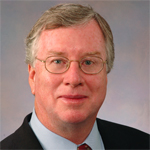For OA, Dr. Samuels first assumed the leadership role in recruiting and following patients for the division’s clinical trials in this disease, and ongoing observational studies funded by his chair’s grants from the National Institutes of Health.
Follow your passions. ‘If you do, you will become the best at what you do & will earn a reputation as a specialist in that field.’ —Dr. Arnold
When he attended his first course to learn rheumatology-directed musculoskeletal ultrasound in 2007, the use of ultrasound in the domestic ultrasound community was in its infancy. “Within a few years, after practicing and attending more courses, I began using it in my daily practice and clinical research collaborations,” Dr. Samuels says. “Since then, I have been teaching rheumatology ultrasound courses nationwide, and developed a curriculum for our fellowship trainees.”

Dr. Edwards
Unlike most rheumatologists, Erin L. Arnold, MD, partner, Orthopaedics and Rheumatology of the North Shore, in Skokie, Ill., grew up with rheumatology in her blood because her father was a rheumatologist.
“A lot of my interest in rheumatology came from watching my dad care for his patients,” says Dr. Arnold. “As a fellow 15 years ago, some earlier data for diagnostic ultrasound started coming out in the field of RA. I flew with my dad to Europe to learn how to do diagnostic ultrasound, and then began following the field and its application to rheumatoid arthritis (RA) and inflammatory RA.” Today, her specialty niche includes inflammatory arthritis, RA, psoriatic arthritis, ankylosing spondylitis and gout.
Choosing Your Niche
In general, individuals who work in medicine seem to get the most reward and provide the greatest impact and benefit to the patients they treat if they focus on something that greatly interests them and that they care deeply about. “I would encourage other rheumatologists to follow their passions,” Dr. Arnold says. “If you do, you will become the best at what you do and will earn a reputation as a specialist in that field.”

Dr. Samuels
When you are establishing your niche, Dr. Arnold says you have to find ways to be involved in patient care that are multi-dimensional. She has such a strong interest in inflammatory arthritis that she has become intimately involved with the Rheumatology Research Foundation by serving as a donor and speaking on the Foundation’s behalf to other potential donors and the media, when necessary. “This impacts patients because they see that they have a partner and advocate for this disease, and someone who can give advice and care about their illness,” she says.


